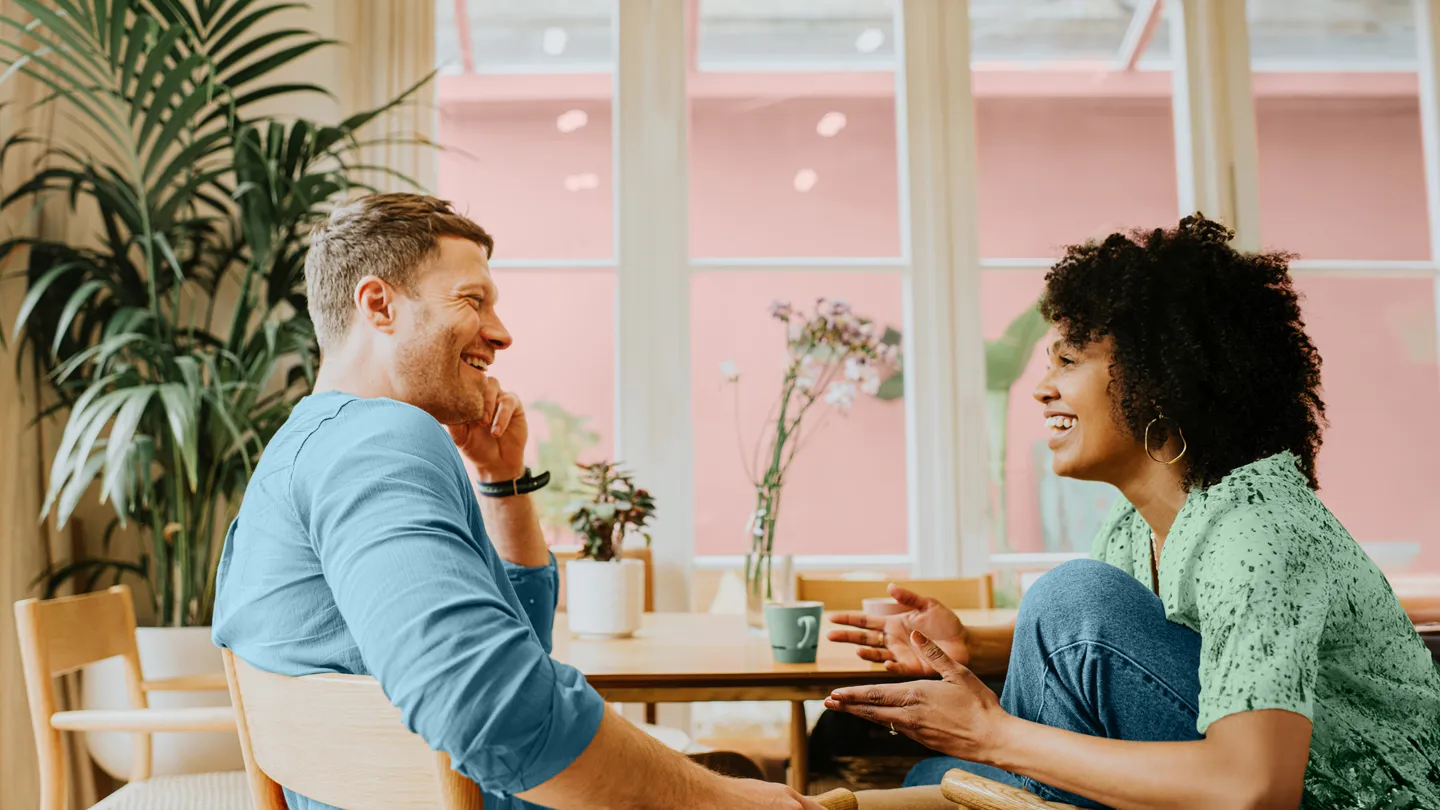Dating can feel exhilarating and daunting all at once. But for many people with anxiety disorders, it can feel like stepping into an intimidating room full of unknowns.
The uncertainty of whether someone will like you, the pressure to make a good impression, and the vulnerability required to open up can all be overwhelming. The emotions can be even more intense for those with generalized anxiety, social anxiety, or other anxiety disorders. The result? Symptoms like ruminating, fear of rejection, and turning to unhelpful coping mechanisms like avoidance and isolation.
“People with anxiety often struggle to tolerate uncertainty. So they tend to overthink, overplan, or avoid dating altogether to try and regain a sense of control,” says Christine Crawford, MD, MPH, an assistant professor of psychiatry at Boston University School of Medicine and associate medical director at the National Alliance on Mental Illness (NAMI).
“Anxiety turns the volume up on dating doubts,” says Susan Albers, PsyD, a clinical psychologist at Cleveland Clinic in Ohio who treats people with anxiety. “Your nervous system doesn’t distinguish between emotional discomfort and physical danger. It just knows you feel uncomfortable and on alert. One moment you’re trying to enjoy a conversation and the next, your brain is scanning for rejection.”
But having anxiety doesn’t mean you’re doomed to dread dating. With the right tools, mindset, and support, it’s entirely possible to enjoy the process — and even thrive in it. These seven expert tips can help.
1. Keep Dating Goals Small and Manageable
Swiping on profiles, juggling conversations, setting up first dates — even for people without a diagnosed anxiety disorder, dating can get overwhelming quickly.
Setting small, realistic goals can help to reduce symptoms of anxiety and avoid burnout. Dr. Crawford recommends limiting your time on the apps. Set aside 15 to 20 minutes a day to swipe on profiles and respond to matches, and avoid deep dives studying people’s profiles and your ongoing conversations. This way, your dating life remains just one component of your busy social life, and you’re not letting it take over your day.
Set short, achievable goals, especially if you’re just starting out, says Crawford. Don’t go in with the ultimate goal of finding “The One.”
Decide in advance how much emotional energy you have to give — and what you’re looking for. It may be to message one person a day or go on one date this month. This can make dating feel more doable, Crawford says.
“It’s important for the person who has an anxiety disorder to set realistic expectations. You don’t want to feel overwhelmed, shut down, and avoid the thing altogether,” Crawford says.
2. Prepare Ahead to Lower Uncertainty (but Stay Flexible)
Just like before a big game day, preparation is key to help you feel more grounded. Where are you meeting for your date? How will you get there? What do you want to wear?
Crawford suggests visualizing the date — look at the menu to decide on what you’ll order ahead of time, pull up your GPS to plan your route to the venue and home, and try on a few outfits until you find the one you’re most comfortable in.
Think of it like preparing for a presentation at work: You want to feel ready but still flexible if things shift. “You want to take as much anxiety-triggering things off your plate as much as possible before the date. Having these things planned out can make you feel more relaxed and ready to focus on the potential connection in front of you,” Crawford says. This is especially important for people who have social anxiety, she says.
3. Lower the Stakes
Booking a three-course dinner on a Saturday night for a first date can be nerve-racking with or without an anxiety disorder diagnosis. Instead, try starting with something low-stakes, like grabbing a coffee, going for a walk, or trying out a new food truck together.
“It’s low-risk. Anxiety lowers when you know you have an easy escape. Having an exit plan, even if you don’t use it, calms your feelings of anxiety,” Dr. Albers says.
Apply a low-stakes mentality to your mindset, too. Tell yourself, “It’s just a date,” Albers says. Too often, daters with anxiety put too much pressure on themselves, questioning if this is the right person or if they’re making a grave mistake.
“Reframe it as a conversation, not a commitment. You’re just two people seeing if there’s a vibe. You’re not auditioning for marriage. I always say, treat the date like a curious experiment, not a final exam. You’re there to connect, learn, and stay grounded in who you are,” she says.
4. Shift Your Mindset From ‘Will They Like Me?’ to ‘Do I Like Them?’
Anxiety often fuels a fear of rejection, causing you to hyper-focus on how you’re coming across and whether the other person likes you. But this mindset can be disempowering and inaccurate, says Crawford. “People with anxiety forget that dating is a two-way street,” she says. “You’re not asking for someone else’s approval. You’re seeking a partner who’s a good fit for your life.”
Stay true to your standards and identify your wants and needs, says Crawford. For example, are you looking for someone intelligent, caring, or funny? Would you be compatible with someone who’s athletic, loves cooking, or enjoys playing video games?
Instead of molding yourself into what you think someone wants, show up authentically and consider: Does this person meet my values, pace, and needs? This shift in perspective doesn’t just take the focus off yourself and lower anxiety — it puts you back in the driver’s seat, Crawford says.
5. Use Grounding Techniques That Work for You
Instead of numbing anxiety with a drink or two or panicking the night before, carve out simple grounding exercises that calm your nervous system before a date.
“One of my favorites is called 5-4-3-2-1 grounding. You name five things you can see, four you can touch, three you can hear, two you can smell, and one you can taste. It brings you right into the present moment and calms that racing mind,” Albers says.
She also recommends pre-date rituals that help you enjoy the process. Make yourself a cup of tea, put on your favorite playlist, and draw a relaxing bath before date night.
Crawford notes that pre-date activities help blow off steam. This could be taking your favorite Spin class at the gym, going for a run, or zoning out and watching a few episodes of a TV show.
Affirmations and positive self-talk are some of the most underrated tools for managing pre-date jitters for people with anxiety, too, Albers says. Actively work on trading in that negative internal voice for calming affirmations. “Something like, ‘I am worthy of connection just as I am,’ or ‘It’s okay to feel nervous; this is me being brave,’ act like psychological anchors,” she says.
6. Lean on Your Support System
You don’t have to navigate anxiety from dating on your own. Having a support system — through therapy, trusted friends, or even group settings — can help you feel grounded and more in control.
Individual therapy and group therapy are both great options that can help. “Across all of these therapies, people often learn that their anxiety doesn’t define them, and they gain the tools and confidence to show up in relationships with more self-trust and less fear,” Albers says.
One specific type of therapy called cognitive behavioral therapy (CBT) is an effective tool for people with anxiety. “It helps people challenge anxious thoughts like, ‘I’m not good enough,’ or ‘I’ll be rejected no matter what,’” she says. “CBT teaches practical tools to reframe those thoughts and manage the physical symptoms of anxiety.”
And outside of therapy, talking things through with someone you trust — a friend, mentor, or family member — can help. If you’re overthinking or need a second opinion, these loved ones can be a trusted sounding board.
7. Reframe Rejection and Don’t Take It Personally
Not hearing back after a date can sting — but it doesn’t mean you did something wrong. “People with anxiety tend to assume the worst — ‘I said the wrong thing,’ or ‘They didn’t like me’ — but that’s anxiety talking, not truth,” Albers says.
Instead of spiraling, remind yourself: “We just weren’t a match, and it doesn’t mean I won’t find someone.” This reframing builds emotional resilience and makes it easier to keep showing up.
You may find a potential match you’ve met isn’t the right fit for your lifestyle and interests, too. “It’s like a lock and key. Not every pairing is going to fit, and that’s okay,” Crawford says.
The Takeaway
- Dating can be tough if you’re living with an anxiety disorder, but with some preparation, mindset shifts, and a strong support system, it can be much less overwhelming.
- To help manage anxiety, keep the stakes low — plan low-key dates, such as going for a coffee or visiting a food truck, instead of committing to a three-course dinner.
- Stay true to yourself, what you’re looking for, and your standards. You’re not here to impress everyone; you’re here to find the right match for you.
Read the full article here




